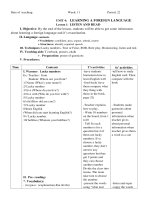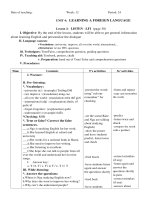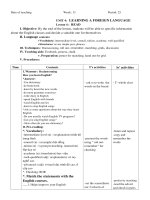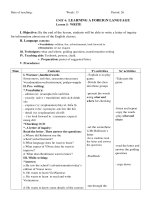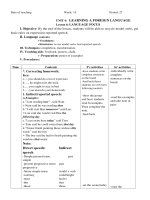Unit 4 (lesson 3)
Bạn đang xem bản rút gọn của tài liệu. Xem và tải ngay bản đầy đủ của tài liệu tại đây (31.35 KB, 2 trang )
Date of teaching: Week: 12 Period: 24
UNIT 4: LEARNING A FOREIGN LANGUAGE
Lesson 3: LISTEN -LF1 (page 38)
I. Objective: By the end of the lesson, students will be able to get general information
about learning English and personalize the dialogue
II. Language contents:
+Vocabulary: university, improve, all over the world, international, …
+Structures: revise WH- questions
III. Techniques: True/False, comprehesion question, guiding questions
IV. Teaching aid: Textbook, posters, chalk
+. Preparation: hand out of True/ False and comprehension questions
V. Procedures:
Time Contents T’s activities Ss’ activities
I. Warmer:
II. Pre- listening:
*. Vocabulary:
- university (n) : (example) Trường ĐH
- (to) improve : (translation) năng cao
- all over the world : (translation) trên thế giới
- international (adj) : (explanation) thuộc về
quốc tế
- forget-forgotten : (explanation) quên
- understand:(v) (example) hiểu
*Checking: ROR
*. True or false? Correct the false
sentences.
___a.Nga is studying English for her work.
___b.She learned English at school and
university
___c.She works for a national bank in Hanoi.
___d.She need to improve her writing.
___e.Her listening is excellent.
___f.She hope she can talk to people from all
over the world and understand her favorite
songs.
• .Answer key:
a. T / b. T / c. F / d. T / e. T / f. T
III. While-listening:
*. Answer the questions:
a.Where is Nga studying English now?
b.Why does she want to improve her writing?
c.Why can’t she understand people?
-present the words
using” rub out-
remember” for
chacking
-set the scene(Kate
and Nga are talking
about studying
English)
-show the poster and
have students
predict, listen twice
and check
-feed bacck
-have students listen
again and answer
the questions shortly
-feed back
-have students
-listen and repeat
-copy and remember
the words
-predict
-listen twice and
check
-compare the result
with a partner
-correct mistakes
(if any)
-listen again and
answer the
questions shortly in
pairs
-correct mistakes
(if any)
-answer about
d.What does she think about English?
*.Talk about your English:
a.Why do you study English?
b.How many hours do you spend on English a day?
c.Which skills are you good at?
d.Which skills are you bad at?
e.What do you do to improve your English?
IV Post-listening: Revision of Modal verbs
-must: phaûi
-have to:phaûi
-should: neân
-oughtto: neân
-may:coù leõ
-Might: coù leõ
*. Form: Modal +infinitive (without to)
*. Revision of Conditional sentences type 1
- If clause:simple present tense
- Main clause: will +infinitive
*. Usage:We can use a modal verbs in a main
clause.The modal verb gives more information
about the outcome relating toability, certainty,
permission, obligation, or necessity.
EX:If you want to get good grades, you must
study hard..
-If you want to improve your English, I can
help you.
*. Practice: Ask ss to do exercise LF1 on page
38
*Answer: c/ ……….you should do exercise regu
larly
d/…….., he might miss the train.
e/……., you ought to stay in bed.
f/ ……..:you must do your homework if you want
to go out.
*. Homework: exercise 5 page 30,
exercisebook
answer about
themselves
-feed back
-give homework
-Let ss work in pairs
to complete the
Conditional
sentences. They
have to use the
modal verbs in
brackets and the
informationin the
box
themselves
-complete the
exercise at home
-Pairwork
